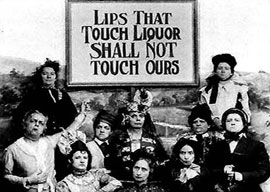
December 17, 2013

December 5, 2013 was the 80th annual Repeal Day, AKA the day that Prohibition was repealed. It is the highest holiday for me and my coreligionists, the American Drunkards (Unreformed). Prohibition is widely regarded as the biggest mistake in American policy ever. It’s hard to imagine now”especially in Los Angeles, where there’s a head shop on every corner”but for 13 years, a rabid coalition of progressive puritan do-gooders successfully forced Americans to make do with bathtub gin. Prohibition created organized crime and killed California’s nascent wine industry.
Historians have largely written Prohibition’s history to serve its greatest proponents: the progressive crypto-Unitarian puritans who currently dominate public discourse. We are led to believe that rather than part and parcel of the progressive movement, Prohibition was a conservative folly, the solitary “move forward” from the past that we can all agree was a step in the wrong direction. This is a blatant falsehood: Prohibition was, through and through, part of a broader movement that sought to impose a hyper-Protestant post-millennialism on the rest of us who love wine, women, and song.
At its heart, progressivism is a Christian heresy that sees it as human civilization’s duty to become more holy than the Almighty himself. Wine might have been good enough for Jesus and King David, but demon alcohol was seen as a major impediment to America as New Jerusalem.
Neither the 18th Amendment nor the Volstead Act would have been possible without other progressive amendments. While nearly no one disagrees that Prohibition was an idiotic and embarrassing national folly, you’d be hard pressed to find people who think that the other progressive amendments (women’s suffrage, income tax, and direct election of Senators) were also mistakes.
Prohibition would have been unthinkable before the 16th Amendment’s progressive income tax, which had been the first new Amendment in over 40 years. Previously, the federal government was largely funded through the liquor excise tax. Banning alcohol at the national level was a logical absurdity. Progressives required an alternative revenue source and they found it in the hard work of Americans. At its root, the income tax is little more than a tax on labor.
The 17th Amendment, involving the direct election of Senators, was an additional stepping stone toward taking our hooch away. Senators had previously been elected by state legislatures, meaning that they were steeped in some notions of statecraft, fealty to state governments, and the type of backroom machine politics of the saloon. The 17th Amendment allowed the people to get what they wanted good and hard (apologies to Mencken, a man who once claimed that he didn’t drink water for the duration of Prohibition).
And so came the 18th Amendment, the one that inflicted the small-town Puritan taboo against liquor on the entire nation. Women, among Prohibition’s greatest supporters, were handsomely rewarded for their efforts against demon alcohol with national suffrage, something that they had hitherto only enjoyed west of the Mississippi in states that needed to sweeten the pot for female pioneers to make the trek out West.
The income tax enshrined the notion of confiscatory tax law into the American canon in such a way that even conservatives can now only conceive of ending it with a flat tax or a sales tax. Who but those far outside of the Overton window advocates a return to the earlier method of funding the federal government with booze and bonds?